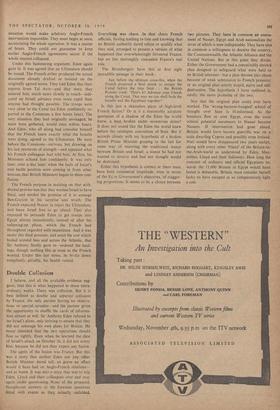Double Collusion
I believe, and all the available evidence sug- gests, that this is what happened in those extra- ordinary weeks. There was collusion. But it is best defined as double and separate collusion by France, the only partner having no reserva- tions or special scruples--and the partner given the opportunity to shuffle the cards of informa- tion almost at will. Sir Anthony Eden refused to see Israel's plans, only striving to ensure that they did not sabotage his own plans for Britain. He never intended that the two operations should fuse so tightly. Even when he learned the date of Israel's attack on October 26, it did not worry him, because he did not then expect any fusion.
The agent of the fusion was France. But this was a story that neither Eden nor any other British Minister dared tell, so grave an effect would it have had on Anglo-French relations— and at home. It was also a story that was to trip Eden, Lloyd and their colleagues over and over again under questioning. None of the prepared, thought-out answers to the foreseen questions fitted with events as they actually unfolded. Everything was chaos. In that chaos French officials, having nothing to lose and knowing that no British authority dared refute or qualify what they said, arranged to present a version of what happened that overwhelmingly favoured France, but no less thoroughly concealed France's real role.
The Brombergers have this at first sight incredible passage in their book :
Just before the ultimate cease-fire, when the French proposed a final attack to occupy the Canal before the time limit . . . the British Premier cried: 'That's it! Advance your friends along the Canal. That way we can shell both the Israelis and the Egyptians together!'
Is this just a shameless piece of high-level French fiction? Or is it a reasonably accurate quotation of a shadow of the Eden the world knew, a man broken under monstrous stress'? It does not sound like the Eden the world knew before the cataleptic convulsion of Suez. But it accords closely with my hypothesis of a broken British Prime Minister groping to the last for some way of restoring the traditional stance between Britain and Israel; a stance he had not wanted to destroy and had not thought would be destroyed.
Either this hypothesis is correct or there must have been ministerial ineptitude, even in terms of the Etint Government's objectives, of stagger- ing proportions. It seems to be a choice between
two pictures. They have in common an assess- ment of Nasser, Egypt and Arab nationalism the error of which is now indisputable. They have also in common a willingness to deceive the country, the Commonwealth, the Atlantic Alliance and the United Nations. But at this point they divide. Either the Government had a conceivably shrewd plan designed to safeguard what were held to be British interests—but a plan thrown into chaos because of weak submission to French pressure; or an original plan utterly stupid, naive and self- destructive. The hypothesis I have outlined is, surely, the more probable of the two.
Not that the original plan could ever have worked. The 'wrong-because-bungled' school of thought over Suez is ill-informed. As the bombers flew in over Egypt, even the most critical potential successors to Nasser became Nassers. If intervention had gone ahead, Britain would have known guerrilla war on a scale dwarfing Cyprus and possibly even Ireland. Nun i would have disappeared two years earlier, along with every other 'friend' of the Britain-in- the-Arab-world as understood by Eden, Mac- millan, Lloyd and their followers. How long the restraint of ordinary and official Egyptians to- wards the 11.000 Britons in Egypt woUld have lasted is debatable. Britain must consider herself lucky to have escaped at so comparatively light a cost.










































 Previous page
Previous page